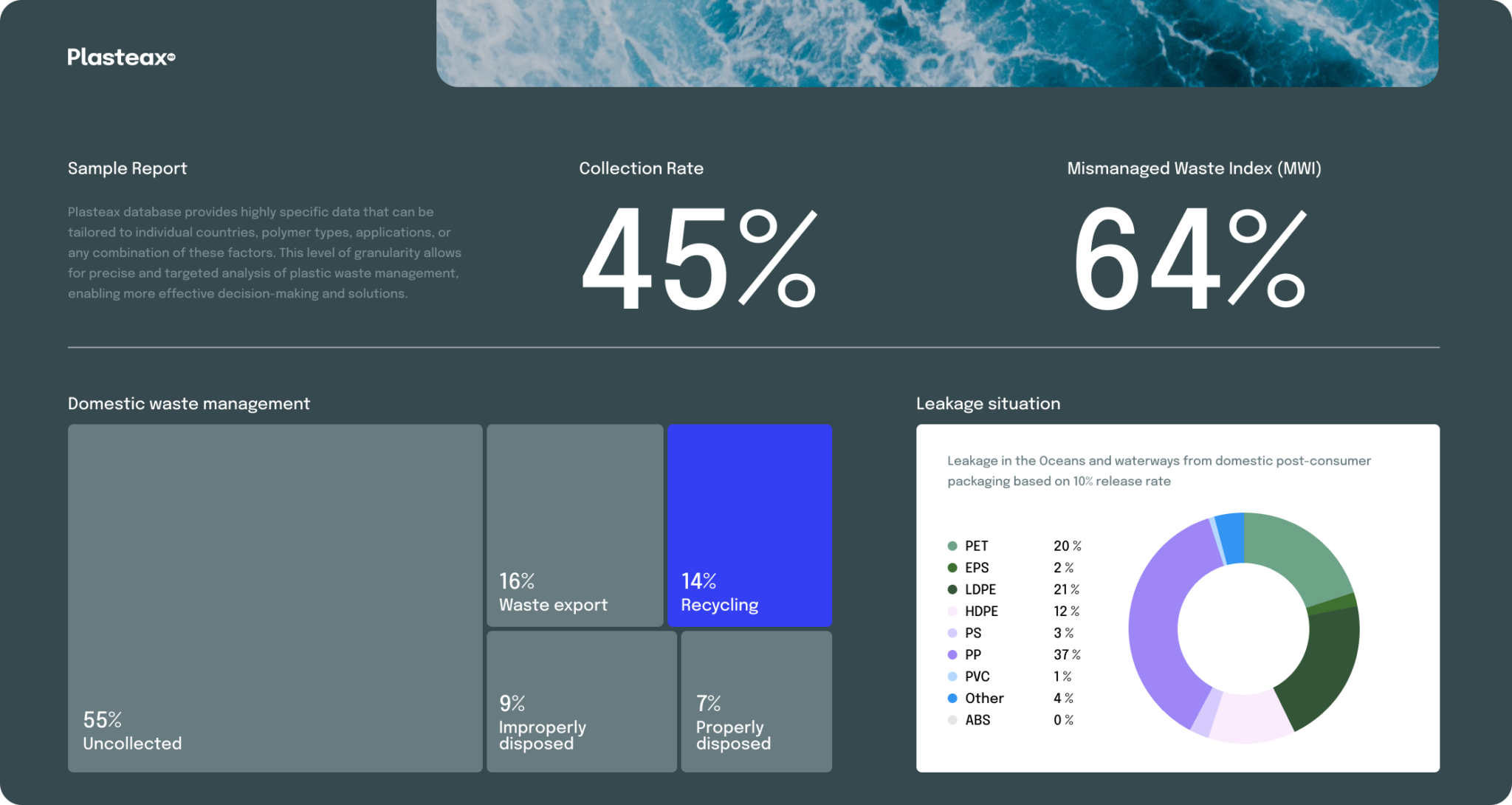
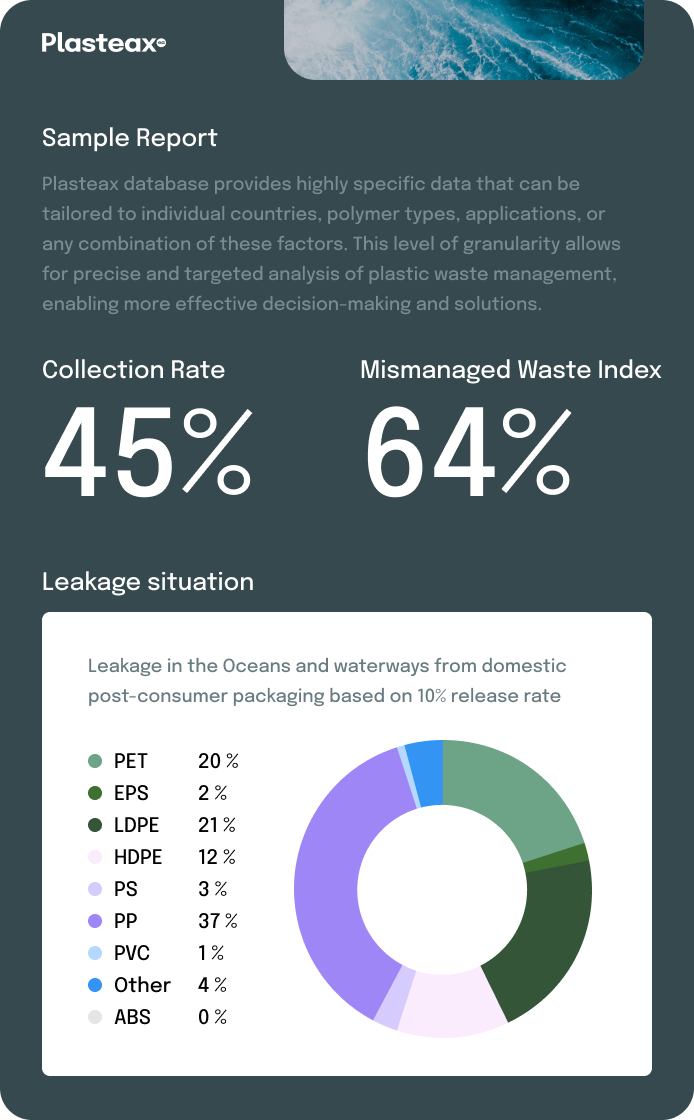
Consistent: Researchers use mass balance modelling, promoting data consistency and meaningful country comparisons.
Granular: Specific information on four indicators at polymer, application, and country levels, providing metrics with high levels of granularity to facilitate detailed assessments.
Transparent: Data collection methodology is available for download, disclosing the data generation sources and offering full transparency to dataset users
Up-to-date: The Plasteax dataset is continuously updated and expanded, ensuring the most current and relevant information is widely available
The expansive Plasteax dataset provides insights on the locations, origins and content of 82% of global plastic waste leakage into oceans and waterways. Data is available in various formats and can be tailored to meet specific user or project requirements.
Plasteax database provides a comprehensive snapshot of the plastic situation within a country, offering specific information on various key indicators. These indicators encompass managed waste, including incineration and sanitary landfill data, recycling rates, levels of mismanaged waste, and instances of plastic leakage.
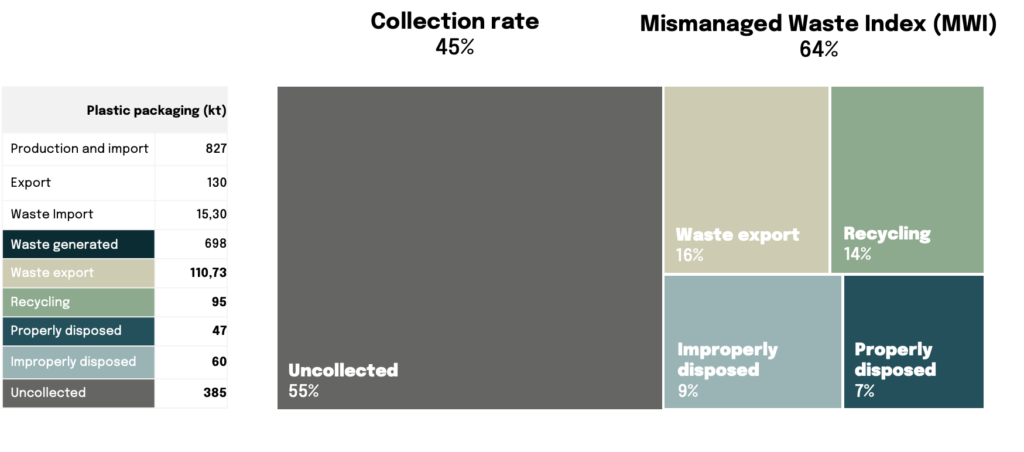
Plasteax database includes valuable information on the export of waste, detailing both the exporting and importing countries involved
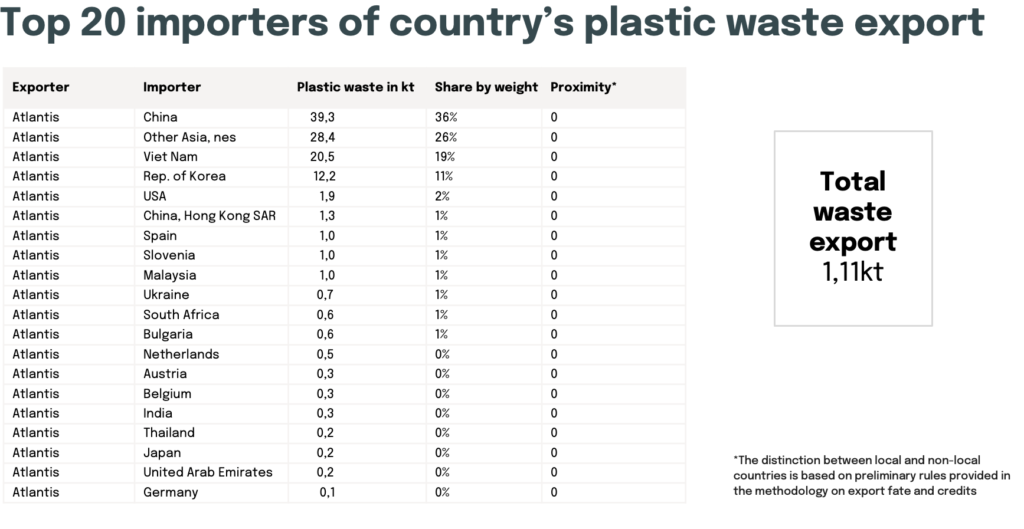
Plasteax database provides insights into nine different plastic polymers across various critical indicators. These indicators cover information related to managed waste, including incineration and sanitary landfill data, recycling rates, levels of mismanaged waste, and instances of plastic leakage.


Plasteax database furnishes data on managed waste, encompassing incineration and sanitary landfill statistics, recycling rates, levels of mismanaged waste, and occurrences of plastic leakage, specifically categorized into six application types.


Combination of factors category x polymer for domestic packaging waste.

Comprehensive view of the plastic waste management situation within a country, with specific metrics for key indicators encompassing; managed waste, incineration and sanitary landfill usage, recycling rates, mismanaged waste levels, and instances of plastic leakage.

Plasteax also provides important information on waste exports, detailing volumes and factors for both the exporting and importing countries.

Coverage of nine plastic polymers across a range of critical indicators including waste generation and mismanagement levels; rates of recycling and improper disposal; metrics about incineration and sanitary landfill; and instances of plastic leakage.


The Plasteax platform furnishes data on managed waste, encompassing incineration and sanitary landfill statistics, recycling rates, levels of mismanaged waste, and occurrences of plastic leakage, specifically categorized into six application types.


In addition to data at the country, polymer and application-specific level, Plasteax provides cross-factor metrics to provide a more detailed view into the impact of different factors on waste generation and leakage.

Check availability for country of interest
Obtain the complete Plasteax dataset with plastic waste management data for 9 polymers, 6 applications and 72 countries
Access specific data for a country, a polymer, an application, or a specific combination of these factors.
For Enteprises:
Enterprises gain a valuable asset with Plasteax data, which provides important insights for plastic footprint assessments and decision-making around plastic production, usage and end-of-life strategies. Nuanced information aids organizations in cultivating sustainable and responsible practices and mitigating negative environmental impacts across the entire plastic product lifecycle.
For NGOs, Governments and Citizens:
Professionals and organizations responsible for and engaged in improving the world’s waste management practices and systems are empowered by Plasteax’s extensive global coverage. Meaningful geographic metrics enable stakeholders to make well-informed decisions and encourage pollution-mitigating transitions by steering investments, technology, initiatives, and solutions to data-supported, effective options.
For Academics:
The consistency, up-to-dateness and granularity of Plasteax data makes this an important resource for global researchers. Pleasteax regularly informs academics as they pursue groundbreaking plastic pollution research and the development of innovative plastic waste management strategies.
Leading organizations have united within the Plastic Footprint Network to unify methodologies for conducting Plastic Footprint assessments and to create and advocate for the adoption and scaling of a single, up-to-date framework to be used by organizations to assess, track and mitigate the environmental impact of their plastic use.
The Plasteax methodology is built on the foundation EA established through their work on the United Nations Environment Program-International Union for Conservation of Nature (UNEP-IUCN) 2020 National Guidance for Plastic Pollution and Shaping Action project.
Verified data sources for calculations provide top-down metrics that are combined with bottom-up information from peer-reviewed studies and field measurements, resulting in specific, verifiable and valuable data and insights for Plasteax users.
In line with EA’s commitment to regularly assess and optimize the methodology with the latest plastic pollution research findings and metrics, the Plasteax platform is actively maintained and updated, and is always evolving. A further commitment to building collaboration and trust through transparency underpins Plasteax’s work and methodology, which is available for download and review.




EA – Earth Action is a dynamic organization — generating novel research, providing consulting services, and leading important social and environmental-impact initiatives to urgently address the most significant sustainability challenges facing the world.
In particular, EA has pioneered solutions and initiatives to address the plastic pollution crisis including the first plastic footprinting methodology, standardized global plastic pollution metrics, and identification of global plastics waste management limits.
Prominent environmental NGOs, multinational corporations, and regulatory bodies at local, national, and international levels trust and turn to EA for plastics expertise as well as opportunities to collaborate on mitigating the threat plastics present to global ecosystems and human prosperity.
See an example of how EA analysts put Plasteax data into action at Plastic Overshoot Day.
Plasteax data are available for 72 countries.
If the country you’re looking for is not yet available, contact-us to request a custom dataset.
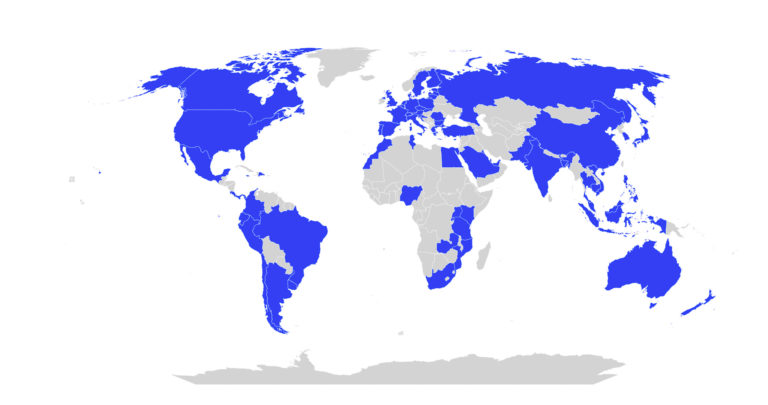
If you need specific data that is currently unavailable for your purposes, please reach out to us for a custom data request.
Starting at $15,000
The complete dataset provides comprehensive insights into the intricacies of plastic waste management. It covers 9 distinct polymers, each examined across 6 specific applications, and 69 countries.
Contact Plasteax to request a quote and gain access to the complete dataset.
Starting from $400
Select the data that meets your needs and requirements. If the data you require is not currently available, we can explore a focused effort to make the additional information available to you.
Contact Plasteax to request a custom data set quote and access desired metrics.
The free generic dataset is available for download, providing valuable insights into the broader plastic landscape. It’s important to note that this generic dataset is not polymer-specific, and as such, it should be used with caution.
For a more precise plastic leakage assessment, Plasteax highly recommends utilizing data that includes polymer-specific values, ensuring the most accurate and detailed analysis possible.
Plasteax is committed to supporting plastic pollution research and provides free access to support educational institutions and academics with their scientific enquiries. Educational professionals and academics can contact Plasteax for specific data requests, subject to certain conditions.
If you are looking for plastic data, looking for collaboration or if you are simply curious, we’re waiting to hear from you. Get in touch below